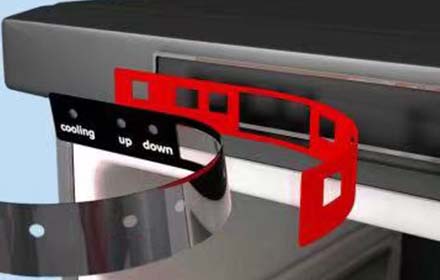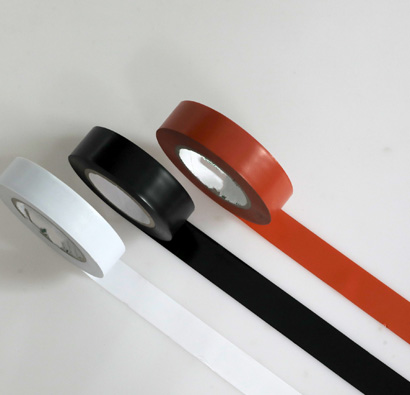
Vinyl electrical tape is an essential tool for electricians, technicians, and DIY enthusiasts alike. Known for its versatility, durability, and specialized features, it plays a critical role in insulating, protecting, and organizing electrical components. This guide explores what vinyl electrical tape is, its various applications, and how it differs from standard PVC tape, offering insight into why it’s a preferred choice in electrical systems.
Vinyl electrical tape is a versatile, pressure-sensitive adhesive tape specifically designed for insulating, protecting, and bundling electrical wires and components. Manufactured from flexible vinyl, it provides superior resistance to abrasion, moisture, UV exposure, and varying environmental conditions, making it suitable for indoor and outdoor use. Known for its high dielectric strength and thermal resistance, vinyl electrical tape ensures effective insulation and safe electrical performance, even in demanding environments. Its stretchable nature allows for a secure fit around irregular shapes, while its strong adhesive ensures durability and long-lasting application.

Electrical Insulation
Vinyl electrical tape is widely used to insulate exposed or connected electrical wires, preventing short circuits and ensuring safety. Its high dielectric strength, flexibility, and ability to conform to irregular shapes make it a reliable choice for wrapping and securing electrical connections in residential, commercial, and industrial setups, protecting against electrical faults and accidental contact.
Wire Bundling and Organization
It helps bundle multiple wires or cables together, maintaining an organized layout in electrical installations. This simplifies wire management, reduces clutter, and prevents tangling. The tape’s flexibility allows easy application, while its strong adhesive ensures wires stay securely in place, whether for temporary setups or permanent installations, contributing to efficient and professional electrical systems.
Environmental Protection
Vinyl electrical tape acts as a barrier against moisture, dust, and UV exposure, making it suitable for outdoor and damp environments. It protects electrical connections from corrosion and environmental damage, ensuring the longevity and reliability of systems in various conditions, including harsh weather or heavy-duty industrial applications.
Color Coding and Identification
Available in multiple colors, vinyl electrical tape is used to identify and organize wires by function, such as live, neutral, or ground. This simplifies troubleshooting, maintenance, and system upgrades, while adhering to professional wiring standards. Its vibrant, long-lasting colors enhance clarity and improve efficiency during electrical work.
Material Composition and Structure
PVC (Polyvinyl Chloride) tape is a versatile material made from synthetic plastic polymer. It is rigid in its natural state and may include fewer plasticizers, making it more robust but less flexible. As a subset of PVC tape, vinyl electrical tape contains a higher concentration of plasticizers, giving it superior elasticity and stretchability. This makes it ideal for wrapping and securing electrical connections.
Flexibility and Stretchability
PVC tape is less flexible and has limited stretch, which may lead to cracking or lifting when applied to irregular surfaces or during temperature fluctuations.
Vinyl electrical tape is engineered to stretch and conform to complex shapes. This elasticity ensures a tighter, longer-lasting seal, particularly important for insulating electrical connections or bundling wires.
Electrical Insulation Properties
PVC tape is not always designed with electrical insulation in mind and may lack the required dielectric strength for critical applications. Vinyl electrical tape is specifically designed to provide reliable electrical insulation, with high dielectric strength to prevent short circuits, protect wires, and ensure safe operation in electrical systems.
Temperature Resistance
PVC tape has limited resistance to high temperatures and may degrade, harden, or lose adhesive properties under extreme conditions. Vinyl electrical tape is designed to withstand a broader temperature range, often rated up to 80°C (176°F) or higher, maintaining its performance in demanding environments such as industrial, outdoor, or high-heat applications.
Environmental Durability
PVC tape is susceptible to UV degradation and may crack or fade over time when exposed to sunlight or harsh environmental conditions. Vinyl electrical tape has superior UV, moisture, and weather resistance, making it suitable for outdoor use and in damp or corrosive environments, ensuring long-term reliability.
Adhesive Strength
The adhesive on PVC tape may lose its effectiveness over time, particularly in fluctuating temperatures or humid environments. Vinyl electrical tape uses pressure-sensitive adhesive specifically formulated to maintain a strong bond even under environmental stress, ensuring wires and components remain securely insulated and bundled.
| Feature | PVC Tape | Vinyl Electrical Tape |
| Material Composition | Polyvinyl Chloride (PVC) | Polyvinyl Chloride (PVC) with plasticizers |
| Flexibility | Less flexible, limited stretch | More flexible, high stretchability |
| Electrical Insulation | May not be designed for electrical insulation | Designed for electrical insulation, high dielectric strength |
| Temperature Resistance | Limited temperature resistance | Good temperature resistance, often rated up to 80°C |
| Environmental Durability | Susceptible to UV degradation and moisture | Resistant to UV, moisture, and weather |
| Adhesive Strength | May degrade over time, especially in harsh environments | Strong, pressure-sensitive adhesive for long-lasting bond |
As technology and electrical systems continue to evolve, the demand for reliable and adaptable materials like vinyl electrical tape is expected to grow. Its superior insulation, environmental resistance, and versatility make it an essential tool in emerging industries such as renewable energy, electric vehicles, and smart home technologies. With ongoing advancements in material science, the future of vinyl electrical tape promises even more durable, efficient, and eco-friendly solutions, solidifying its place as a critical component in modern electrical applications.